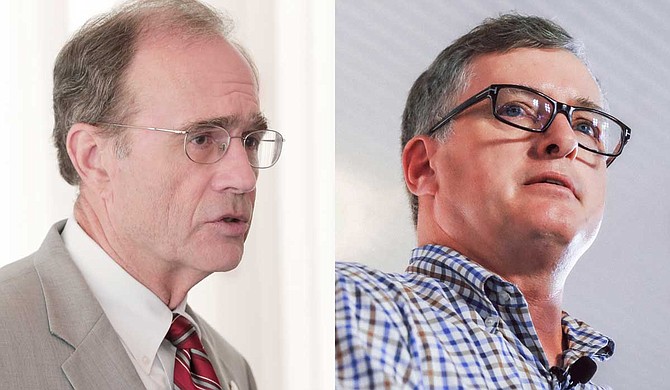Mississippi Secretary of State Delbert Hosemann (left), the Republican nominee for lieutenant governor, and Mississippi House Rep. Jay Hughes (right), the Democratic nominee, took part in a 30-minute televised debate on Sept. 12, 2019. Photo by Ashton Pittman
The Republican and Democratic candidates for Mississippi lieutenant governor found more to agree than disagree on in Thursday night's 30-minute debate, with similar positions on teacher pay, private-school vouchers and transparency. Democrat Jay Hughes and Republican Delbert Hosemann did disagree on raising the minimum wage, however.
In Mississippi, lieutenant governors have significant power when it comes to making laws because they serve in an executive and legislative role and preside as president of the Mississippi Senate.
Hughes, a Democratic Mississippi House representative from Oxford, gave a pointed answer when WJTV debate moderator Byron Brown asked if he supports the State using public funds to pay tuition for kids to go to private schools.
"Absolutely not. it's public dollars for public schools. Period. And that's a big difference between Mr. Hosemann and I," said Hughes, who is known for his public-school advocacy.
Hosemann Supports More Limited Special Needs Vouchers
While Hughes suggested that his position marked a significant difference with his Republican opponent, Mississippi Secretary of State Delbert Hosemann, the GOP candidate said he does not support increasing the State's private-school voucher program.
"Ninety-one percent of our kids are in public schools. That's where I'm going to concentrate," Hosemann answered.
At the debate, though, Hosemann suggested he does support vouchers on a limited basis.
"There are issues with special needs for special children, and I have ... concerns about that, and when we have time I'll discuss it," said Hosemann, whose time to answer the question was running out.
On Friday morning, the Jackson Free Press reached out to the Republican's campaign. Communications Director Leah Rupp Smith told the Jackson Free Press that, first and foremost, he wants to fully fund special-education services in all public schools. Estimates from the Parents Campaign show that Mississippi underfunded special-needs education by about $29.4 million in 2019.
Hosemann's policy stipulates that, in cases where a child has a special need that their local public school does not have the facilities or resources to meet, that child should be allowed to go to a different public school. His view would allow exceptions in cases where no other public school can provide the necessary services for a special need like severe autism, for example, and there does exist a private school alternative or special purpose school that is qualified to provide those services. In that case, Hosemann thinks, parents should have access to tuition vouchers for a school that can provide for their child's needs.
Mississippi 2019 Elections
Read stories about Mississippi's upcoming 2019 election, including the gubernatorial election.
That is a significantly more limited proposal than the current voucher program, which will expire next year unless the Legislature extends it. Right now, Mississippi's private vouchers, known as Educational Scholarship Accounts, cover a select number of children who require special-needs learning. But a legislative PEER report last December found that, in many cases, public funds are paying for those children to go to private schools that do not even have special-needs programs.
One of the schools participating in the ESA program, Columbia Academy in Marion County, explicitly states in its student handbook that it is not equipped for children with learning disabilities.
"In consideration of the fact that Columbia Academy is a private school and receives no federal funding to provide special classes or assistance for students who may have learning disabilities or who have been diagnosed with Attention Deficit Disorder, Dyslexia, and other exceptionalities," the 2018-2019 handbook reads. "Any person wishing to enroll his or her child at Columbia Academy acknowledges this fact and must exercise good judgment as to whether the child enrolling would be best served by attending Columbia Academy."
In the PEER study, nearly 18 percent of parents whose children received ESA funds reported that they did not use them either because they "could not locate a private school meeting (the) child's needs" or because they "did not receive needed services in private school." Over the past three years, about $3.84 million worth of ESA funds were left unspent. Hosemann's proposal calls for more accountability measures for any voucher money dispensed, even under a more limited system.
Earlier this year, Republican leaders in the Legislature, including House Speaker Philip Gunn and current Lt. Gov. Tate Reeves, snuck $3 million in additional funding for the ESA program into an unrelated funding bill after standalone legislation increase voucher funding failed.
Without telling lawmakers they added voucher funds during committee negotiations, the Republican leaders handed members an appropriations bill to fund other parts of the State government. Hughes and other House members in both parties received the bill just 23 minutes before the vote. Most voted in favor of what had been an uncontroversial funding measure, only to find out about the voucher funds afterward.
Though Republicans and Democrats in the Legislature tried to rescind their votes, the additional voucher funds survived.
'Show the People What is Going On'
At Thursday night's debate, Hosemann said he wants more transparency in the legislative process to avoid future "surprises."
"Not only do I want to broadcast, webcast the actual Senate hearings, I want to do all the committee hearings so people can see their government at work," Hosemann said. "They can see those committee members, and not only who the chairman is, but all the members. That's the way we really have effective government is where we show the people what is going on and (that there is) not any surprise coming out of committee."
Let's Talk Jackson Politics Podcast
Issues-focused election podcasts with Hinds County, legislative and statewide candidates focusing on substance over partisan horse-race politics.
When the moderator asked Hughes where he stands on legislative transparency, the Democratic candidate accused Hosemann of stealing his platform.
"Well, that's an interesting question because I came up with that exact thing two years ago, and I'm afraid if he copies any more of my policies we're gonna have to have a ballot that says Jay Hughes versus Jay Hughes," Hughes said, noting that he has introduced several transparency bills that died in the House.
"I don't know if it was his idea. He didn't have any legislation passed during the four years that he was in the House that he was the primary sponsor on, so I guess we'll see," Hosemann said.
Equal Pay for Women, Higher Pay for State Workers and Teachers
Hughes addressed failed legislation, though, later in the short debate when asked if he supports equal pay for equal work for women, which he called his "highest priority."
"There's just no excuse that we have not passed that and that it gets killed every year," Hughes said of equal-page legislation. "In fact, I was a co-sponsor of one of those bills that got killed, so the fact that I didn't have legislation passed is also because of the games that have been played by the establishment. So we need to pass it. We need to pass it now."
For several years in a row, the Evelyn Gandy Equal Pay Act has died in the Legislature—a note that Reeves' opponent in the race for governor, Democratic Attorney General Jim Hood, has pointed out, as did Reeves' now-vanquished GOP primary opponent, Bill Waller. In May, Mississippi became the only state without an equal-pay law after Alabama Gov. Kay Ivey, a Republican, signed one into law there.
Hosemann said he supports equal pay, too—and higher pay for state employees.
"Yes, I believe in equal pay. My chief of staff is female. My associates that run our office, our leadership team is majority female," Hosemann said.
"And I'll tell you what else we're going to do: We're going to ask for everyone—except for education, corrections, the judiciary and child protective services—to reduce their budget by 1 percent next year. That one-percent will fund a raise for all of Mississippi's hard working employees. They work hard in Mississippi. They deserve a raise. Our corrections, our mental-health workers, (they) are all undercompensated."
Hosemann does not support raising the state's overall minimum wage, though. He noted that he started off working a minimum-wage job as a grocery stocker, and said we need to focus instead on workforce development.
"I don't want to thwart somebody with a startup job like I (had). ... Our workers need those startup jobs," Hosemann said. "And our individual companies will provide that. What we need is a better educated workforce. They'll demand higher pay, and they'll deserve higher pay."
Hughes said he supports raising the minimum wage, but did not offer a specific number. Raising it, he said, would pull Mississippi out of the economic mire.
"It's going to lift us out of first place in poverty," he said.
Both candidates said they want significant increases in public-education funding and yearly increases in teacher pay.
"We've got to get back to common sense instead of Common Core," Hughes said. "We need less standardized testing. We need better pay for everyone that's in the school system—not just teachers. We need to find the classrooms instead of the cronies and the testing companies."
Hosemann called for a "meaningful raise every year."
"It seems like what we've done in the past is we've balanced the budget off teachers and education so it ends up being (addressed) at the end of the year every (legislative) year. I want to do it at the beginning of the year," Hosemann said.
The Republican candidate said his plans to raise teacher pay would not be based simply off bringing Mississippi up to the regional average as other statewide candidates this year have promised. Instead, he said, the State should raise teacher pay enough to stop the exodus of educators from the State and solve critical shortages throughout Mississippi.
"The way to do this is to make sure no teacher makes a decision on whether to teach in public schools based on economics," Hosemann said.
To do that, "our starting salaries have to be equal to or greater than everybody else," he said.
Teachers make thousands more in the states surrounding Mississippi. The National Education Association's 2019 rankings of states found that Mississippi teachers make, on average, $44,908 per year. Directly to the west in Louisiana, though, teachers average $49,801 per year, while Arkansas teachers average $48,304. To the east, Alabama teachers average $50,391 per year. Northward, in Tennessee, teachers make about $50,099 per year, the NEA found.
Both Looking at Medicaid Expansion
Near the end of the debate, the moderator asked Hughes and Hosemann if they support expanding Medicaid in Mississippi, which would require accepting over $1 billion a year in federal funds available under former President Barack Obama’s 2010 Affordable Care Act. Estimates suggest that expanding Medicaid would help at least 300,000 more Mississippians—and keep rural hospital emergency rooms open.
“We need to do that because we shouldn’t be having a death sentence on someone who has a treatable condition. And these are people that are paying their part. These are working people,” Hughes said. “So it’s very important that we cover (them) because otherwise the city and the state pays for it.”
People who make too much for regular Medicaid but not enough to qualify for federal subsidies to help them afford private insurance would be eligible for Medicaid if Mississippi decided to expand.
Advocates for expansion also note that it could help keep rural hospitals afloat. Five rural hospitals have closed in Mississippi since 2013, when current Gov. Phil Bryant and Lt. Gov. Tate Reeves refused to accept the expansion funds. Both opposed Obama and his signature law, and continue to do so. The emergency room closures happened, in part, because hospitals had to swallow the costs of uninsured people coming to their emergency rooms—often for non-emergency care. Right now, about half of the state’s remaining rural hospitals are in danger of closing.
“We have five counties right now that don’t have an emergency room and that means a stroke is a death sentence. And that’s wrong. My mom died in the back of an ambulance on the way to a hospital that was just three miles too far,” Hughes said during Thursday night’s debate.
Hosemann said he was looking at “all areas” to figure out how to “make sure that our people are covered by insurance, and particularly those that are working.”
He said he is open to expanding Medicaid, and is looking at the successes and pitfalls in other states that expanded. He did suggest, though, that any potential expansion in Mississippi may be put on hold as challenges to the ACA and expansion plans in other states make their way through federal court. Kentucky and Arkansas both expanded Medicaid, but added work requirements for beneficiaries. In March, a federal judge struck down work requirements in both states.
Separately, a federal judge in Texas ruled earlier this year that the Affordable Care Act is unconstitutional, but supporters of the ACA appealed that ruling to the 5th Circuit U.S. Court of Appeals in New Orleans. The U.S. Supreme Court, which has already upheld the ACA in two prior cases, could ultimately decide the law’s fate once again. Republican leaders across the country, including Gov. Bryant, support the anti-ACA lawsuit.
“This is a $6 billion decision. And I am for looking at all areas we can to make sure that our people are covered by insurance and particularly those that are working,” Hosemann said at Thursday night’s debate.
Hughes said he supports a moderate expansion plan offered by the Mississippi Hospital Association. It would require participants to pay a $20 monthly premium and relatively small fees for certain services.
Roads, Bridges, the State Flag and 'A Plastic Spoon'
Each candidate offered solutions for paying to repair the state's crumbling roads and bridges. Hughes wants to use proceeds from the internet sales tax; Hosemann said he wants to allow counties to raise taxes on gas and diesel to pay for repairs.
Both men agreed that the Legislature should not change the Mississippi state flag, which includes the Confederate battle emblem, instead leaving it up to voters in a statewide referendum. In the last referendum on the flag, in 2001, Mississippi voted along race lines to keep the emblem in the flag. .
"Mississippians will ask when they want to change their state flag," Hosemann said.
Hughes, who said he believes the current flag does drive economic opportunity away, agreed.
"That's going to have to be done by the people, or it will not be accepted by the people," the Democrat said.
With so many similar views on policy, Hughes tried earlier in the debate to draw a line between himself and Hosemann on the basis of their experiences and their personalities. Hughes noted that he has taught in a public-school classroom before—and that he was born into poorer circumstances than his GOP rival.
"While others were born with a silver spoon in their mouth, I was born with a plastic spoon in mine," Hughes said—a line that drew a chorus of boos when he used it at the Neshoba County Fair earlier in the summer.
"I think if he was born with a plastic spoon in his mouth, that was probably difficult for his mother," Hosemann replied moments later.
Unlike other states where the role is often mostly ceremonial, the Mississippi lieutenant governor presides as president of the Mississippi Senate, where he or she can appoint committee chairs that have the power to choose which bills do and do not make it to the floor for a vote. If elected, Hughes or Hosemann would wield substantial power to champion or kill legislation.
Voters will choose among candidates for statewide offices, including governor and lieutenant governor, in the general election on Nov. 6, 2019. Voters must register 30 days before an election to be eligible to vote.
More information on voting, voter registration and voter ID is available on the secretary of state's website at sos.ms.gov.
Follow State Reporter Ashton Pittman on Twitter @ashtonpittman. Send tips to [email protected]. Read more about statewide elections at jacksonfreepress.com/2019elections.
More stories by this author
- Governor Attempts to Ban Mississippi Abortions, Citing Need to Preserve PPE
- Rep. Palazzo: Rural Hospitals ‘On Brink’ of ‘Collapse,’ Need Relief Amid Pandemic
- Two Mississippi Congressmen Skip Vote on COVID-19 Emergency Response Bill
- 'Do Not Go to Church': Three Forrest County Coronavirus Cases Bring Warnings
- 'An Abortion Desert': Mississippi Women May Feel Effect of Louisiana Case





Comments
Use the comment form below to begin a discussion about this content.
comments powered by Disqus